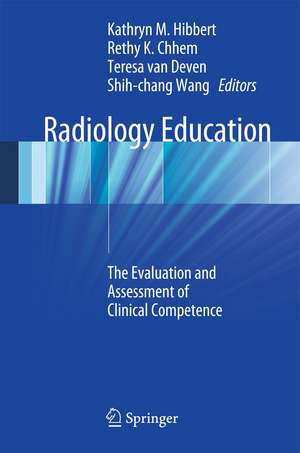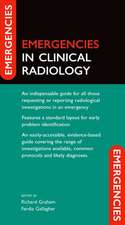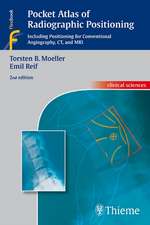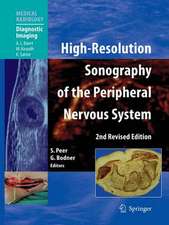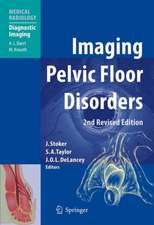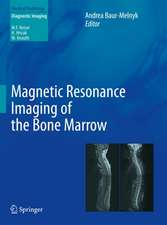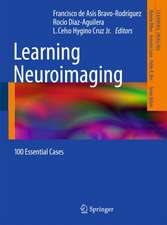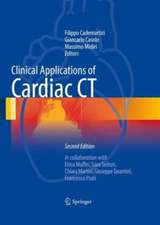Radiology Education: The Evaluation and Assessment of Clinical Competence
Editat de Kathryn M. Hibbert, Rethy K. Chhem, Teresa Van Deven, Shih-chang Wangen Limba Engleză Hardback – 30 mai 2012
| Toate formatele și edițiile | Preț | Express |
|---|---|---|
| Paperback (1) | 894.74 lei 6-8 săpt. | |
| Springer Berlin, Heidelberg – 23 aug 2016 | 894.74 lei 6-8 săpt. | |
| Hardback (1) | 718.10 lei 3-5 săpt. | |
| Springer Berlin, Heidelberg – 30 mai 2012 | 718.10 lei 3-5 săpt. |
Preț: 718.10 lei
Preț vechi: 755.88 lei
-5% Nou
Puncte Express: 1077
Preț estimativ în valută:
137.41€ • 146.94$ • 114.57£
137.41€ • 146.94$ • 114.57£
Carte disponibilă
Livrare economică 27 martie-10 aprilie
Preluare comenzi: 021 569.72.76
Specificații
ISBN-13: 9783642275999
ISBN-10: 3642275990
Pagini: 250
Ilustrații: XVII, 205 p.
Dimensiuni: 155 x 235 x 18 mm
Greutate: 0.48 kg
Ediția:2012
Editura: Springer Berlin, Heidelberg
Colecția Springer
Locul publicării:Berlin, Heidelberg, Germany
ISBN-10: 3642275990
Pagini: 250
Ilustrații: XVII, 205 p.
Dimensiuni: 155 x 235 x 18 mm
Greutate: 0.48 kg
Ediția:2012
Editura: Springer Berlin, Heidelberg
Colecția Springer
Locul publicării:Berlin, Heidelberg, Germany
Public țintă
Professional/practitionerCuprins
Part 1: Evaluation and assessment for Non-Educators
The Nature of Radiological Expertise.-Fundamentals of Assessment and Evaluation: Clarification of terminology.-Measuring clinical performance: Theories, practice, ethics.-Competence in other professions: Expanding opportunities and emerging practices.
Part 2: Evaluation and assessment in Radiology education
The Philosophy, Principles and Practice of Assessment and Evaluation in Radiology.-Experiential Requirements and Competencies in Radiology Training.-Assessing Trainees During Educational Rounds.-Assessment and Evaluation of Programs.-Assessment and Evaluation in a Transnational Radiodiagnosis Training Program.
Part 3: Case Studies: Theory into practice
Competence in radiological/nuclear risk communication.-Case study from Europe.-Measuring clinical competence of Radiology Education programs and residents: The Egyptian experience.-Measuring clinical competence in Nuclear Medicine: The Philippines experience.-Assessing performance of Clinical Medical Physicists: IAEA perspective.-Assessment of Radiation Oncology Medical Physics Residents: The London, Ontario Experience.-Final Remarks.
The Nature of Radiological Expertise.-Fundamentals of Assessment and Evaluation: Clarification of terminology.-Measuring clinical performance: Theories, practice, ethics.-Competence in other professions: Expanding opportunities and emerging practices.
Part 2: Evaluation and assessment in Radiology education
The Philosophy, Principles and Practice of Assessment and Evaluation in Radiology.-Experiential Requirements and Competencies in Radiology Training.-Assessing Trainees During Educational Rounds.-Assessment and Evaluation of Programs.-Assessment and Evaluation in a Transnational Radiodiagnosis Training Program.
Part 3: Case Studies: Theory into practice
Competence in radiological/nuclear risk communication.-Case study from Europe.-Measuring clinical competence of Radiology Education programs and residents: The Egyptian experience.-Measuring clinical competence in Nuclear Medicine: The Philippines experience.-Assessing performance of Clinical Medical Physicists: IAEA perspective.-Assessment of Radiation Oncology Medical Physics Residents: The London, Ontario Experience.-Final Remarks.
Recenzii
From the reviews:
“This is a fascinating insight into the academic and clinical field of medical and specialist education and assessment. The book is a valuable resource for those wishing to benchmark or develop their education and assessment frameworks, and is also of interest to anyone who is involved in mentoring radiology trainees. It is useful to educators from other disciplines in medical education or nursing and allied health, as the broad issues it tackles are multidisciplinary, and often culturally analogous.” (Sharon Stewart, RAD Magazine, November, 2013)
“This is a fascinating insight into the academic and clinical field of medical and specialist education and assessment. The book is a valuable resource for those wishing to benchmark or develop their education and assessment frameworks, and is also of interest to anyone who is involved in mentoring radiology trainees. It is useful to educators from other disciplines in medical education or nursing and allied health, as the broad issues it tackles are multidisciplinary, and often culturally analogous.” (Sharon Stewart, RAD Magazine, November, 2013)
Textul de pe ultima copertă
This book reviews the philosophies, theories, and principles that underpin assessment and evaluation in radiology education, highlighting emerging practices and work done in the field. The sometimes conflicting assessment and evaluation needs of accreditation bodies, academic programs, trainees, and patients are carefully considered. The final section of the book examines assessment and evaluation in practice, through the development of rich case studies reflecting the implementation of a variety of approaches.
This is the third book in a trilogy devoted to the scholarship of radiology education and is the culmination of an important initiative to improve medical imaging students’ learning, teaching, and scholarship by bringing together experienced educators and medical professionals. The previous two books focused on the culture and the learning organizations in which our future radiologists are educated and on the application of educational principles in the education of radiologists. Here, the trilogy comes full circle: attending to the assessment and evaluation of the education of its members has much to offer back to the learning of the organization.
This is the third book in a trilogy devoted to the scholarship of radiology education and is the culmination of an important initiative to improve medical imaging students’ learning, teaching, and scholarship by bringing together experienced educators and medical professionals. The previous two books focused on the culture and the learning organizations in which our future radiologists are educated and on the application of educational principles in the education of radiologists. Here, the trilogy comes full circle: attending to the assessment and evaluation of the education of its members has much to offer back to the learning of the organization.
Caracteristici
Third volume of a trilogy devoted to radiology education and improvement of medical imaging students’ learning, teaching, and scholarship Reviews the philosophies, theories, and principles that underpin assessment and evaluation in radiology education Includes a series of rich case studies Written by an international group of experienced educators and medical professionals
